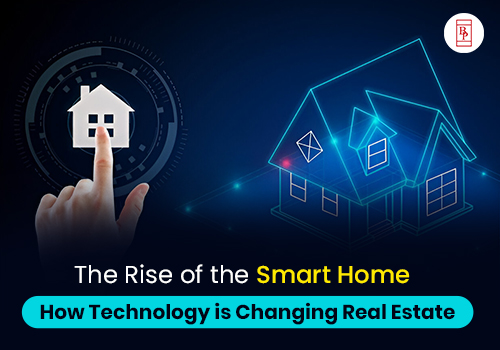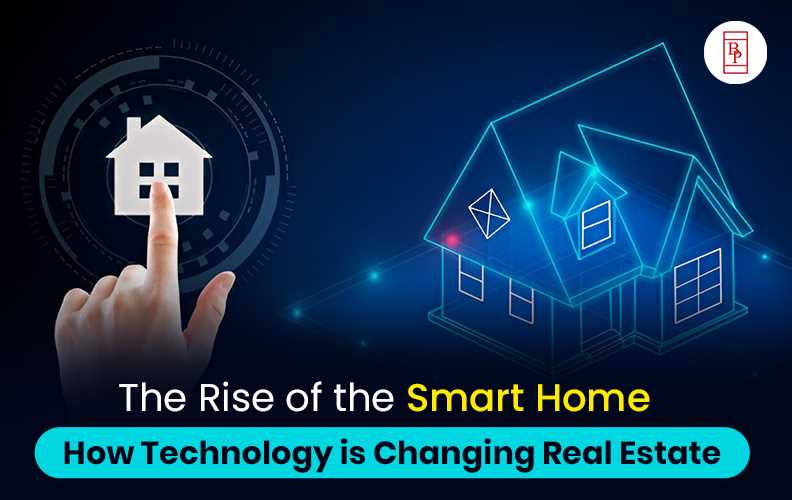The Rise of the Smart Home: How Technology is Changing Real Estate

 In the past decade, technology has radically transformed nearly every aspect of our lives, and the real estate market is no exception. As the world moves toward a more connected and automated lifestyle, the rise of the smart home has become a key factor shaping the future of real estate. From voice-controlled thermostats to automated security systems, smart home technology is no longer a luxury but an expectation for homeowners and renters alike. In this blog, we will explore how smart home technology is influencing the real estate industry, its impact on property values, and what the future holds for Bellevue Real Estate in 2025 and beyond.
In the past decade, technology has radically transformed nearly every aspect of our lives, and the real estate market is no exception. As the world moves toward a more connected and automated lifestyle, the rise of the smart home has become a key factor shaping the future of real estate. From voice-controlled thermostats to automated security systems, smart home technology is no longer a luxury but an expectation for homeowners and renters alike. In this blog, we will explore how smart home technology is influencing the real estate industry, its impact on property values, and what the future holds for Bellevue Real Estate in 2025 and beyond.
What is a Smart Home?
Before delving into the effects of smart homes on the real estate market, it’s essential to understand what a smart home is. A smart home refers to a property equipped with internet-connected devices that allow homeowners to control and monitor systems and appliances remotely through smartphones, tablets, or voice assistants. These devices include smart thermostats, lighting systems, security cameras, door locks, appliances, and entertainment systems.
The ability to manage various aspects of a home remotely not only enhances convenience but also improves energy efficiency, safety, and comfort. Smart homes are becoming an essential part of modern living, and as the technology continues to evolve, they are reshaping how we think about living spaces and, more importantly, how properties are bought, sold, and valued in the real estate market.
The Influence of Smart Homes on the Real Estate Market
1. Increasing Property Value
One of the most significant impacts of smart homes on the real estate market is the potential increase in property value. Properties equipped with smart technology are often considered more desirable to potential buyers, leading to higher demand and, consequently, higher prices. This is especially true in markets where tech-savvy consumers are more prevalent, such as urban areas and regions with a high concentration of millennials and Gen Z buyers.
In fact, studies have shown that homes with smart features, such as smart thermostats, lighting, and security systems, can sell for up to 5% more than homes without these features. In a competitive real estate market, adding smart technology to a home can set it apart from similar properties, making it more attractive to prospective buyers who are looking for convenience, energy efficiency, and modern amenities.
2. Enhanced Appeal to Tech-Savvy Buyers
As more people embrace technology in their daily lives, the demand for smart homes continues to grow. Younger generations, particularly millennials and Gen Z, are more likely to prioritize smart home features when purchasing a property. These tech-savvy buyers are accustomed to devices that make their lives more efficient and streamlined, and they expect the same convenience in their homes.
Real estate agents are increasingly highlighting smart features as key selling points, especially in listings targeting these younger demographics. Whether it’s a smart fridge that can suggest recipes or a security system that alerts homeowners of unusual activity, these high-tech features have become essential in attracting today’s homebuyers.
3. Energy Efficiency and Cost Savings
Smart homes offer significant benefits in terms of energy efficiency and cost savings. Smart thermostats, lighting systems, and appliances are designed to optimize energy use, reducing waste and lowering utility bills. This can be an attractive selling point for both homebuyers and renters, especially as energy costs continue to rise.
For instance, smart thermostats like Nest or Ecobee allow homeowners to adjust the temperature of their homes remotely, ensuring that the heating or cooling systems are only running when needed. Similarly, smart lighting systems can be programmed to turn off automatically when rooms are not in use, further reducing energy consumption. These energy-efficient features not only benefit the environment but also help homeowners save money, which is an increasingly important consideration in today’s real estate market.
4. Improved Security Features
Home security is a primary concern for most homeowners, and smart home technology has revolutionized the way we approach home security. Traditional security systems required homeowners to rely on alarms and cameras that were often complex to install and manage. However, modern smart home security systems are easy to install and offer a wide range of features, such as motion detectors, smart locks, video surveillance, and remote monitoring.
Smart home security devices like Ring doorbell cameras, Arlo cameras, and smart locks offer homeowners peace of mind by allowing them to monitor and control their homes from anywhere in the world. With the ability to receive real-time notifications of security breaches and to remotely lock doors or view live video feeds, smart home security systems have become a must-have feature for many buyers in today’s market.
5. Simplified Home Management
Managing a home can be a time-consuming task, but smart home technology has made it easier to stay on top of daily responsibilities. Smart appliances like refrigerators, washing machines, and dishwashers can be controlled remotely, allowing homeowners to monitor their usage and set schedules to optimize efficiency. Additionally, voice assistants like Amazon Alexa and Google Assistant can help homeowners manage their schedules, play music, control lights, and even order groceries, all with simple voice commands.
This level of convenience is not only appealing to homeowners but also to potential buyers looking for homes that offer the latest in automation and ease of living. As smart home technology continues to advance, more homeowners will expect these types of features in their homes, making it a key consideration when buying or selling property.
The Future of Real Estate: The Role of Smart Homes in 2025
Looking ahead to 2025, it is clear that smart home technology will continue to play a central role in shaping the future of real estate. As more people embrace the idea of connected living, the demand for smart homes is expected to grow, and the technology will become even more integrated into the fabric of daily life.
1. Integration with Artificial Intelligence
In 2025, smart homes will likely become even smarter, with the integration of artificial intelligence (AI) playing a significant role. AI-powered smart homes will be able to learn homeowners’ preferences and routines, adjusting settings automatically based on past behavior. For example, the system could learn when a homeowner typically arrives home and adjust the thermostat, lighting, and security settings accordingly. This level of automation will make homes even more efficient and comfortable, further increasing their appeal to potential buyers.
2. Increased Focus on Sustainability
As concerns about climate change and environmental sustainability continue to rise, smart homes will play an essential role in reducing carbon footprints and promoting sustainability. Smart homes equipped with energy-efficient features like solar panels, energy storage systems, and smart grids will become more common by 2025. These homes will not only be more affordable to maintain but will also appeal to buyers who are increasingly conscious of their environmental impact.
3. 5G and the Internet of Things (IoT)
With the rollout of 5G technology, the Internet of Things (IoT) will expand rapidly, enabling smarter homes and more interconnected devices. 5G will provide the faster internet speeds required to support a growing number of devices within the home, from smart refrigerators to autonomous vehicles. In 2025, homes will be fully connected ecosystems where everything from lighting to security to entertainment is seamlessly integrated, providing an unmatched level of convenience for homeowners.
4. Smart Homes as a Standard Feature
As the demand for smart homes continues to grow, real estate developers will begin to incorporate smart technology into new homes as standard features rather than optional upgrades. In 2025, it is expected that smart homes will become the norm, with nearly every new home built equipped with smart devices. This shift will make it easier for buyers to find properties with the features they want and will increase competition among developers to offer the latest and most advanced smart home technology.
5. Changing the Way Homes Are Bought and Sold
The rise of smart homes will also influence how homes are bought and sold. Real estate agents will need to adapt to this changing landscape by learning how to market smart features and emphasizing the convenience and benefits they offer. Virtual tours and augmented reality (AR) will become more common in property showings, allowing potential buyers to experience a home remotely and interact with smart home features in real time. This will further streamline the home-buying process, especially as remote work and digital interactions continue to gain popularity.
Conclusion
The rise of the smart home is undeniably changing the real estate market, transforming how homes are built, bought, and lived in. As technology continues to evolve, the future of real estate in 2025 will be dominated by homes that are more connected, efficient, and secure than ever before. With increasing demand for smart features, energy efficiency, and automation, the real estate industry is adapting to meet the needs of modern homebuyers. For those looking to buy or sell property, embracing the smart home revolution will be essential for staying competitive in the ever-evolving Real Estate Market in Bellevue WA.
As we move into the future, it is clear that smart homes will no longer be a luxury but a standard expectation for homeowners, further blurring the lines between technology and everyday life. With innovation at the forefront, the future of real estate promises to be smarter, more sustainable, and more connected than ever before.
